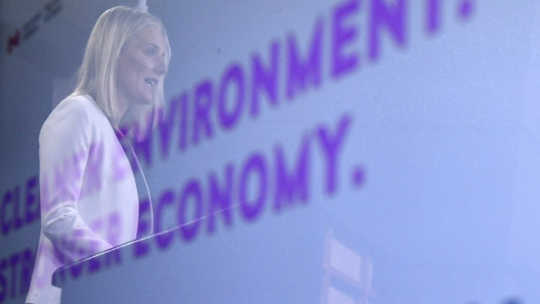
Hoe ver uitmekaar is Republikeine en Demokrate wanneer dit kom by menings oor klimaatsverandering? Nie so ver, dui 'n nuwe studie aan. Hulle is net te party gefokus om op te let.
Researchers surveyed 2,000 adults and discovered that across party lines, there is general agreement that climate change is real, that it is caused by human activity, and that something should be done to mitigate it.
The study also reveals that people are more likely to support the same climate policy proposal when they think that their own political party supports it. Further, both Democrats and Republicans overestimate how much their peers oppose the ideas of the other party.
“Democratic and Republican citizens alike evaluate a carbon tax or cap and trade policy based on who proposed it—above and beyond their thoughts on the details of the policy, or on whether it is consistent with their beliefs about the importance of climate change,” says David Sherman, a professor of psychological and brain sciences at the University of California, Santa Barbara, and senior author of the paper, which appears in Perspektiewe op Sielkundige Wetenskap.
“They do this despite stating themselves that policy considerations should be more important than partisanship.”
“We found that people routinely place party over policy and disagree for the sake of disagreeing,” says lead author Leaf Van Boven, a psychology and neuroscience professor at the University of Colorado at Boulder.
“If you want to know who will support a climate policy, just look at which political party supports it. Climate change belief alone is not the whole story.”
Researchers set out to explore the psychological reasons that—despite warnings about economic, social, and humanitarian impacts of climate change—US lawmakers have yet to enact a national policy. Previous studies and conventional wisdom suggested this was primarily because most Republicans are skeptical of climate change.
So the researchers conducted two studies in 2014 and 2016 with diverse national panels of over 2,000 US adults, asking: Is climate change happening? Does it pose a risk to humans? Is human activity responsible? And can reducing greenhouse gas emissions reduce climate change?
Sixty-six percent of Republicans, 74 percent of Independents, and 90 percent of Democrats said they believed in human-caused climate change and the utility of reducing greenhouse gases.
“Just before the presidential election when most Republicans were voting for Trump, who characterized climate change as a ‘hoax,’ they nevertheless expressed a belief in climate change,” notes Van Boven.
As part of the 2014 study, the researchers showed participants one of two proposed policies. One was a cap-and-trade policy that historically has been championed by Democrats. The other was a revenue-neutral carbon tax based on policies recently advocated by Republicans. Participants were told that 95 percent of Republicans and 10 percent of Democrats supported the policy, or vice versa.
Regardless of the content, Democrats supported policies from Democrats more strongly, and Republicans supported policies from Republicans more strongly.
“If you want to know who will support a climate policy, just look at which political party supports it,” says Phil Ehret, who just completed his PhD in social psychology. “Climate change belief alone is not the whole story.”
in 'n verwante studie of 500 people, the authors used actual language from a proposed climate change policy that was part of ballot initiative I-732 in Washington State in 2016.
The researchers highlighted either Democrats or Republicans who genuinely supported or opposed the policy to the study volunteers and found similar results.
“What is more, people anticipate that others, their fellow Republican and Democratic citizens will be even more polarized and influenced by political party than they actually are,” Sherman says.
“This creates a false norm of consensus and unanimity within each party that, for example, other Republicans will reject any policy proposed by Democrats. This perception of within-party unanimity makes it very difficult to cross party lines.”
Distrust of the other side, combined with a false assumption that the two parties sharply disagree makes it difficult for good, bipartisan ideas to gain traction, the researchers say.
“One of the foundational insights of social psychology is the under-appreciated influence of social norms and that actions are determined more by perceptions of norms than the actual norms,” Sherman says. “It is crucially important for lawmakers and voters alike to be informed about what others actually think about environmental issues such as climate change.
“There are many reasons the media focuses on differences between partisans,” he adds, “but our work shows why it is important to highlight this strong consensus as well as the even stronger consensus that citizens should evaluate policies on their details and impact and ability to address problems, and not based on which party proposes them.”
Bron: UC Santa Barbara
Verwante Boeke:
at InnerSelf Market en Amazon























